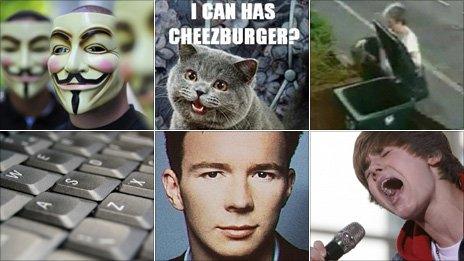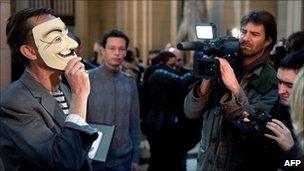The strange virtual world of 4chan
- Published

Coventry cat tormentor Mary Bale has become the latest victim of 4chan - a website credited with creating some of the web's biggest phenomena, whose users wreak havoc across cyberspace. Just what is it all about?
When CCTV footage emerged of a middle-aged lady stroking a cat before dumping it in a wheelie bin, millions were outraged.
But in one murky corner of the internet, the scent of blood was detected.
En masse, an army of cyber-pranksters swung into action and culprit Mary Bale was initially outed not by the forces of Fleet Street but by users of an online community.
According to reports, they quickly established her identity, her workplace and her employer's phone number. Death threats and prank calls quickly followed.
It was the latest headline-grabbing prank from 4chan, an iconoclastic US site that has given the world such web staples as lolcats and Rickrolling. It claims 22 million page impressions every day and 9.5 million unique users every month.
Other sites, such as eBaum and Something Awful, may thrive on similar viral material or "memes", but none have become as notorious as 4chan.
The anarchic messageboard, which was originally set up to discuss Japanese anime and manga, has also become distinguished by its lawlessness, obscene content and vindictive campaigns - and is definitely not safe for reading at work.
Less savoury campaigns staged by users have included flooding YouTube with pornography under the guise of teen-pop videos, googling Canadian pop star Justin Bieber's name en masse alongside the word "syphilis" to push the combination up the search engine's rankings, and inserting a virtual giant swastika constructed from avatars into a children's online computer game.
Rob Manuel of B3ta.com, a British website founded on similar, albeit more whimsical lines, says 4chan's success has been founded on turning "trolling" - essentially, annoying other internet users - into an art form.
"It's the equivalent of all the kids at the back of the classroom passing each other notes and being sarcastic," he adds.
"Essentially, it's about taking trolling to the nth degree and saying: 'Let's put all the trolls in one place and see what happens.'"
Browsers who are easily offended are best advised to steer clear of the site, which has virtually no rules other than a ban on images of child abuse. Racist, homophobic and pornographic content are all regular themes on its "random" or "/b/" messageboard.

Anti-Scientology protesters have adopted the Anonymous guise
Users can post without having to register or provide a name, and the "Anonymous" tag has become a blanket term for online users acting collectively. The tag has also become synonymous with online mischief makers engaging in stunts like targeting other websites by flooding their bandwidth.
Nonetheless, 4chan's most popular behests to the broader online community have been relatively innocent.
Lolcats - images of anthropomorphic felines captioned with mis-spelt web-speak ("im in ur bed zleepin" and so on) - made their first appearance on the site, during its regular "Caturday" slot, but went on to dominate blogs and sites the length and breadth of the internet.
And Rickrolling - tricking other web users into following a link, which turns out to be the video to Rick Astley's 1987 hit Never Gonna Give You Up - became a massively popular prank, with the song's YouTube video having generated more than 36 million views.
But not all stunts originating from the site's users have been so harmless. In 2009 YouTube was forced to remove hundreds of pornographic videos apparently uploaded by 4chan users. The footage was uploaded under the names of teenage pop favourites such as Hannah Montana and Jonas Brothers, and clips typically began with footage of their videos before groups of adults performing graphic sex acts filled the screen.
Another 4chan favourite is Pedobear, a harmless-looking ursoid cartoon character who, despite his loveable appearance... you get the idea.
Other 4chan stunts have been loosely political in character, including Project Chanology, a movement that protests against the practices of the Church of Scientology.
Using the "Anonymous" persona, its tactics have included urging users to google the phrase "Scientology is a cult", pushing it to the top of Google Hot Trends, as well as staging real-world protests.
In response, the Church of Scientology has labelled them "terrorists" guilty of "hate crimes".
Despite its anarchic, Wild West nature, 4chan does have a leader, of sorts - a poster called moot. He is New Yorker Christopher Poole, who set up the site while a 15-year-old living at home with his mum.
At first, he says, he was simply offering fans of anime and manga somewhere to post pictures, but the anonymity, the lack of an archive and the very basic board design created a "breeding pit" for memes and edgy humour.
Wisely, Mr Poole does not defend every excess perpetuated by members of the community, and admits that his 55-year-old mother "wouldn't necessarily understand" something like Pedobear.
He says the trolls have been called "an internet hate machine", but insists that "for the most part it's a lot more bark than bite".
Mr Poole adds: "They like to get a reaction but they like to do it from the comfort of their chair at home in the basement. For the most part 4channers are more or less decent people, they're not going to go too crazy.
"The conversation that takes place on the site is raw and unfiltered, when people contribute anonymously you get their innermost self they express things they would otherwise be shy to do in a forum where they could be identified, I'm a fan of the conversation that results, for better for worse."
Of course, not everyone believes the worst of 4chan is excused by its best.
Technology journalist Jack Schofield says the community can fulfil a useful function, outwitting the mainstream media when it fails to understand technology - but the anonymity and lack of restraint means members frequently cross the line.
"I regard it as something of a court jester, able to get away with things that normally people can't get away with," he says.
"The problem with it is that it can easily go too far. But re-routing Justin Bieber fans to porn just isn't acceptable."
What seems certain is that 4chan will continue to shape digital culture for some time yet.
But if you are tempted to visit the site, don't say you haven't been warned.

- Published25 August 2010